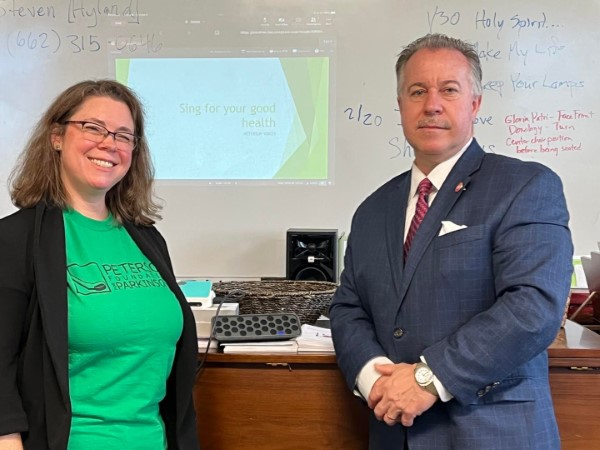
Tennessee State Rep. Mike Sparks with Carrie Friddell, who leads the Peterson Voices, a singing group for Parkinson’s patients that meets every Tuesday in Franklin, Tennessee
Knowledge of medicine and the human body has changed substantially over time. Sometimes it’s funny to look back at medicinal practices of the past and read about the crazy things doctors and physicians were trying out. But as we have progressed and developed new technologies to treat sickness and disability, some techniques have proven to be worth keeping around.
One treatment people have studied for thousands of years is the relationship between humans and art. We have always had a desire to create it and enjoy it, and music has always had a deep influence on listeners. It’s probably been a part of every culture since the beginning of recorded history. Because of the strong connection to music, it has long been thought that music and sound could be used to treat certain physical and mental illnesses.
In Greek mythology, Apollo, god of music, had a son named Aesculapius who could cure diseases of the mind through song. Egyptian priests are said to have healed people with music. The great philosopher Aristotle had reason to believe music purified emotions. And in the Bible, David plays a harp to free King Saul of an evil spirit.
The first uses of music in modern medicine were recorded in several books in the 18th century. It was in this period that we transitioned from a medieval understanding of music having an effect on the soul to a more sophisticated understanding of its direct effects on the nervous system.
Since then, music therapy has continued to be developed throughout the world to treat physical and mental illness. Musicians would visit soldiers in hospitals and homes in the U.S. and U.K. after World War I to play songs for them, noticeably alleviating the effects of their trauma.
Music-based therapies are still used to treat PTSD and aid in the healing process for returning veterans. We now know that music therapy can treat a wide range of medical issues, including Alzheimer’s, anxiety, insomnia, depression, headaches, substance abuse and addiction, brain trauma, and OCD by helping patients develop motor skills, cope with emotional trauma, increase concentration, improve social skills and more.
Scientists have observed a decrease in heart rate, blood pressure and muscle tension in patients during exposure to music. Engaging with music also activates regions of the brain that affect memory, emotion, movement and decision-making. Music causes the brain to release rushes of endorphins, a happiness chemical that relieves stress. An advantage to music therapy is that it is highly personalized, customizable and suitable for all ages and abilities. It crosses language and communication barriers and helps people with developmental and learning disabilities.
Sound and vibration therapy, derived from ancient Southeast Asian practices, also relieve stress and pain, but they are based on a separate theoretical framework.
Some music therapy techniques are as simple as listening to different genres of music, while others may require a patient to write or play a song based on the desired emotional effect. Some sessions may be community-based, and others may be intentionally isolating. The point is that there is massive variety among the models and implementations for music therapy.
Now, 130 board-certified therapists work in the state of Tennessee, and advocates for music therapy have asked legislators to promote and encourage its use.
Tennessee State Representative Mike Sparks from Smyrna was first introduced to the concept of music therapy when his sister fell and hit her head, causing permanent brain damage.
Later, Sparks reported, “I heard her singing a song . . . It was John Denver, ‘Take Me Home Country Roads’,” Sparks told the Tennessee General Assembly on March 28. “I walked up to see her about two years ago and I said ‘Hey, how ya doing?’ She didn’t know my name but she knew the words to that song, and I started thinking, ‘Man there has gotta be something here with the power of music.’”
Sparks, who also supports the use of music therapy for its ability to heal and reduce suicides among military veterans, sponsored a bill to make the week of Feb. 28 Music Therapy Awareness Week. The House Joint Resolution 740 aims to help promote music therapy in the state, encourage more graduates in the field—Belmont, Austin Peay and UTC offer degrees in music therapy—with the ultimate effect of improving mental and physical health in the state.
“Music therapy can help individuals express emotions, improve social skills, increase self confidence, cope with loss, develop motor skills, improve relaxation skills and increase concentration,” the bill reads.
The Tennessee House voted unanimously on March 28 to adopt Sparks’ proposed Music Therapy Awareness Week, which is bi-partisanly co-sponsored by 18 other members of the house. It will now transition to the Tennessee Senate.
For more information on music therapy in Tennessee, visit tnmusictherapy.org.













